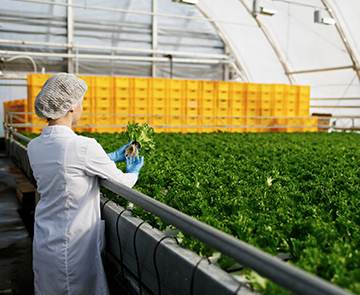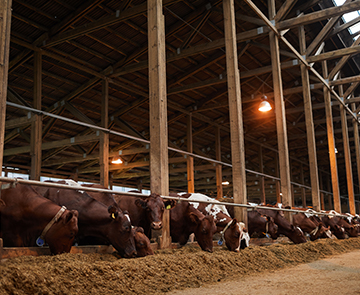Agricultural and Biosystems Engineering Program
- Home
- Ras Sudr
- Field of Desert Agriculture
- Agricultural and Biosystems Engineering Program

Agricultural and Bio-Systems Engineering Program
Program Details
| Courses: 52 Courses | Duration: 04 Years | Language: English |
| Seats: 100 Seats (47 Rsvd) | Credit Hours: 138 Cr. Hrs. | Program: Agricultural and Bio-systems Engineering |
Program Description
The program deals with studying the concepts of basic science in the fields of agricultural engineering and mechanization of agricultural processes and the suitable irrigation methods and systems for new special desert crops in the reclaimed desert areas to optimize the production of land and water units under conditions of water scarcity and its quality.
In addition to new and renewable energies as well as the establishment, operation and management of automated service stations, recycling of agricultural wastes, the concepts of biodiversity and methods of conservation of natural resources and agricultural legislation and ethics related to the environment and human health.
Graduates Attributes
- Planning and designing irrigation systems for sustainable industrial agricultural industry projects
- Managing agricultural business with high efficiency.
- Establishing and Managing Mechanization service stations.
- Using appropriate up dated technologies to solve technical and economic problems in agricultural engineering.
- Showing his professional abilities well.
- Development, operation and maintenance of irrigation and drainage systems.
- Managing water resources efficiently.
- Dealing with machines, equipment and tools in a safe manner.
- Management of operations related to the Agricultural buildings.
Job Opportunities

- Egyptian and foreign Universities, research centres and institutes
- Ministry of Environment
- Ministry of Agriculture and Land Reclamation
- Ministry of Water Resources and Irrigation
- Consulting companies for agricultural and land reclamation projects.
- Mechanization service stations
- Agricultural equipment factories
- Animal production farms
- Fish farms and Nile and marine fisheries
- Poultry production farms
- Standards and Metrology Authority
Getting started
-
Semester 1
7 Courses
Code Course Name LCT LAB TUT OTH CNTCT CH SWL ECTS ABE141 Physics & Agricultural Meteorology 2 3 2 0 5 3 165 6 ABT110 General Chemistry 2 3 0 0 5 3 165 6 MAT111 Mathematics I 3 1 0 0 4 3 150 6 PPT110 Principles of Plant Production 1 3 0 0 4 2 120 4 FST120 Principles of food & dairy sciences 2 3 0 0 5 3 165 6 UC1 University Requirement (1) 2 0 0 0 2 2 90 4 UC2 University Requirement (2) 2 0 0 0 2 2 90 4 -
Semester 2
8 Courses
Code Course Name LCT LAB TUT OTH CNTCT CH SWL ECTS ABE120 Principles of Agricultural Engineering 2 3 0 0 5 3 165 6 APT110 Principles of Animal Production 1 3 4 2 120 4 PPT111 Plant Morphological & physiological 2 3 0 0 5 3 165 6 PBC201 Biochemistry I 2 2 0 0 4 3 150 6 UC3 University Requirement (3) 2 0 0 0 2 2 90 4 UC4 University Requirement (4) 2 0 0 0 2 2 90 4 UC5 University Requirement (5) 2 0 0 0 2 2 90 4 UE1 Elective University Requirement (1) 2 0 0 0 2 2 90 4 -
Semester 3
7 Courses
Code Course Name LCT LAB TUT OTH CNTCT CH SWL ECTS ABT240 Applied Bio-Statics 1 3 0 0 4 2 120 4 MEC252 Heat & Mass Transfer 2 1 2 0 5 3 165 6 CSE013 Introduction to Information systems & technology 2 1 0 0 3 2 105 4 PPT212 Principles of the Desert Environment 2 3 0 0 5 3 165 6 PPT240 Principles of Soil Science 2 3 0 0 5 3 165 6 ENG111 English 2 2 0 0 0 2 2 90 4 UC6 University Requirement (6) 2 0 0 0 2 2 90 4 -
Semester 4
8 Courses
Code Course Name LCT LAB TUT OTH CNTCT CH SWL ECTS ABT220 Principles of Genetics 1 3 0 0 4 2 120 4 ABT 230 General Microbiology 1 3 0 0 4 2 120 4 MEC011 Engineering Drawing (1) 1 2 3 0 6 3 180 6 MEC041 Production Engineering 2 3 0 0 5 3 165 6 CTP211 Surveying 2 0 1 3 6 3 180 6 UC7 University Requirement (7) 2 0 0 0 2 2 90 4 UE2 Elective University Requirement (2) 2 0 0 0 2 2 90 4 UE3 Elective University Requirement (3) 2 0 0 0 2 2 90 4 -
Semester 5
8 Courses
Code Course Name LCT LAB TUT OTH CNTCT CH SWL ECTS ABE313 On-Farm Irrigation & Drainage Engineering 1 3 0 0 4 2 120 4 ABE321 Machinery Systems Engineering 1 3 0 0 4 2 120 4 ABE322 Tractor & agricultural Power 2 3 0 0 5 3 165 6 ABE330 Agricultural & Biological Systems Engineering 1 3 0 0 4 2 120 4 ABE345 Engineering Mathematics 1 3 0 0 4 2 120 4 MEC251 Fluid Mechanics 2 1 2 0 5 3 165 6 E1 Elective Course (1) 2 3 0 0 5 3 165 6 E1 Elective Course (1) 2 3 0 0 5 3 165 6 -
Semester 6
6 Courses
Code Course Name LCT LAB TUT OTH CNTCT CH SWL ECTS ABE315 Planning & Design of On- Farm Irrigation & Drainage Systems 2 3 0 0 5 3 165 6 ABE323 Theory & design of agricultural machinery 2 3 0 0 5 3 165 6 ABE 324 Post – harvest Engineering of Agricultural Products 2 3 0 0 5 3 165 6 CIV232 Soil Mechanics (1) 2 1 2 0 5 3 165 6 E2 Elective Course (2) 2 3 0 0 5 3 165 6 E2 Elective Course (2) 2 3 0 0 5 3 165 6 -
Semester 7
2 Courses
Code Course Name LCT LAB TUT OTH CNTCT CH SWL ECTS ABE491 Field training 0 0 30 30 5 600 10 ABE492 Graduation project 0 0 24 24 4 500 8 -
Semester 8
6 Courses
Code Course Name LCT LAB TUT OTH CNTCT CH SWL ECTS ABE444 Protected Agriculture Engineering 2 3 0 0 5 3 165 6 ABE435 Computer Applications in Agricultural Engineering 2 3 0 0 5 3 165 6 ABE448 Simulation, Modelling & Expert Systems 2 3 0 0 5 3 165 6 E3 Elective Course (3)3 Courses On- Farm Irrigation & Drainage Engineering Sub-Program 2 3 0 0 5 3 165 6 E4 Elective Course (4) 3 Courses for Farm machineries & power Engineering Sub-Program 2 3 0 0 5 3 165 6 E5 Elective Course (5) 3 Courses for Bio—Systems Engineering Sub-Program 2 3 0 0 5 3 165 6

Pro.Abdel-Ghany Mohamed Abdel-Ghany El-Gindy
Professor abdelghany.elgindy@ksiu.edu.egFAQs
The program deals with studying the concepts of basic science in the fields of agricultural engineering and mechanization of agricultural processes and the suitable irrigation methods and systems for new special desert crops in the reclaimed desert areas to optimize the production of land and water units under conditions of water scarcity and its quality.
In addition to new and renewable energies as well as the establishment, operation and management of automated service stations, recycling of agricultural wastes, the concepts of biodiversity and methods of conservation of natural resources and agricultural legislation and ethics related to the environment and human health.
Testimonials
 Ahmed Adel
Ahmed Adel At KSIU the learning experience is different and unique. It is an excellent mix of practical learning, the best academic staff, and a lot of activities to do in my free time.
Related Courses
The program deals with studying the concepts of basic science in the fields of agricultural engineering for new special desert crops.
- 08 Semesters
- 138 Cr. Hrs.
The program deals with studying the concepts of basic science in fields of field crops and horticultural and apply appropriate agricultural practices in the desert areas.
- 08 Semesters
- 138 Cr. Hrs.
The program deals with studying the basic concepts of animal, poultry and fish production in the desert areas.
- 08 Sesmsters
- 138 Cr. Hrs.
Latest Blog
-

Translation and Simultaneous Interpreting in German students Earn 5 DAAD Scholarships
Apr 18, 2024 -

King Salman International University announces Bid No. (2) for the year 2024, with closed envelopes, to rent a space to work in a pharmacy activity
Apr 18, 2024 -

Bid No. (1) for the year 2024, with closed envelopes, to rent a space to work as a medical analysis laboratory for a one-day hospital
Apr 18, 2024



